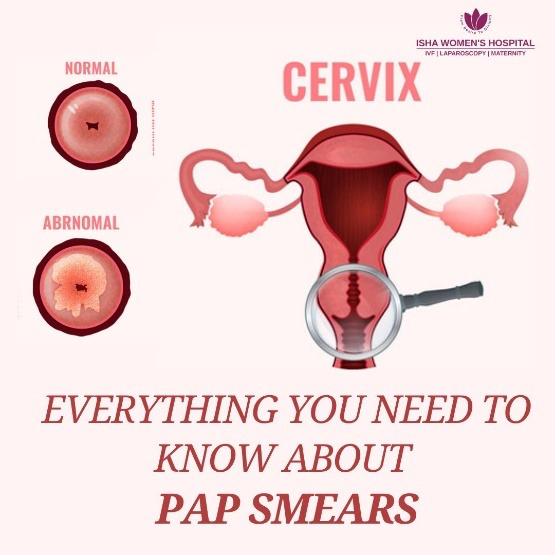Everything You Need to Know About Pap Smears

Understanding the Basics of Pap Smears
Let’s understand what it is, why it’s important, and who should get it done.
What Is a Pap Smear?
It’s named after Dr. George Papanicolaou, the scientist who developed this life-saving test.
The main goal of a Pap smear is to catch any changes in the cervical cells early, before they turn into cancer.
Why Is a Pap Smear Important?
Here’s what a Pap smear can detect:
- Cervical cancer: The test can find early warning signs before cancer develops.
- Human papillomavirus (HPV): A common virus that can cause changes in cervical cells.
- Infections or inflammation: Even if not cancerous, these conditions can affect your reproductive health.
The earlier abnormal cells are found, the easier they are to treat. That’s why regular Pap smears are crucial. Thanks to this test, the number of cervical cancer deaths has dropped significantly around the world.
At Isha Women’s Hospital, we encourage every woman to prioritize regular screenings. Dr. Chinmay Pataki ensures thorough evaluation and clear guidance, making him the most trusted name in women’s healthcare across the Thane district.
Who Should Get a Pap Smear?
Start at age 21: Even if you’re not sexually active, it’s best to begin screening at 21.
How often?
- Ages 21 to 29: Every 3 years
- Ages 30 to 65: Every 5 years if combined with an HPV test (this is called co-testing)
You may no longer need Pap smears after age 65 if:
- You’ve had three consecutive normal test results
- You’ve never had abnormal cervical cells or cancer
- You’ve had a hysterectomy for non-cancer reasons
Pap Smear Procedure, Results & Aftercare
How to Prepare for a Pap Smear
For the most accurate results, a few simple preparations can help:
Avoid these 24–48 hours before your test:
- Sexual intercourse
- Vaginal douching
- Using tampons
- Vaginal creams, medications, or lubricants
Understanding Pap Smear Results
Once your test is complete, the results are typically ready within a few days. Here’s what they mean:
- Normal Result: This means your cervical cells are healthy and no abnormalities were found. You can continue with routine screenings as advised.
- Abnormal Result: Don’t panic! An abnormal Pap smear doesn’t mean you have cancer. It simply means some changes were found in your cervical cells.
Here are some common terms you might see:
- ASCUS: Atypical squamous cells of undetermined significance – mildly abnormal cells that may or may not be related to HPV.
- LSIL/HSIL: Low- or high-grade squamous intraepithelial lesions may indicate early changes in the cervix that need follow-up.
- AGC: Atypical glandular cells – changes in cells that may require more testing.
- A repeat Pap smear after a few months
- An HPV test to check for virus strains linked to cervical cancer
- A colposcopy (a closer examination of the cervix)
- A biopsy, if needed, to further evaluate the cells
Prevention, Risks, and Myths
Can Pap Smears Prevent Cervical Cancer?
How it helps:
- Detects pre-cancerous changes in cervical cells
- Identifies HPV infections that can lead to cervical cancer
- Allows for early treatment, before the problem gets serious
Common Myths About Pap Smears
“Only sexually active women need it.”
False! All women aged 21 and above should start screening, regardless of sexual history.
“Pap smears are very painful.”
Not true! You might feel some pressure or slight discomfort, but it’s usually quick and manageable.
“I’ve had the HPV vaccine, so I don’t need Pap smears.”
While the vaccine protects against major HPV types, it doesn’t cover all risks. Regular Pap tests are still essential.
“An abnormal Pap smear means I have cancer.”
Not necessarily. It could be minor cell changes, an infection, or HPV-related changes that can be treated early.
Every woman deserves compassionate, expert care, and it starts with simple steps like regular Pap smears. Don’t wait for symptoms to appear. Be proactive, be informed, and take control of your reproductive health today. Under the guidance of Dr. Chinmay Pataki—the best gynecologist, fertility specialist in Thane —you’ll receive world-class care in a safe, respectful, and understanding environment. Whether it’s a routine check-up or advanced fertility treatment, Isha Women’s Hospital in Dombivli is the most trusted and advanced fertility centre in Thane.
Prioritize your health & protect your future.
Frequently Asked Questions (FAQs)
Ans - No, it's usually just slightly uncomfortable, not painful.
2. What happens if my Pap smear is abnormal?
Ans - Your doctor may repeat the test, do HPV testing, or schedule a colposcopy.
3. Can I get a Pap smear during my period?
Ans - It's best to reschedule if you're on your period.
4. Do virgins need Pap smears?
Ans - Yes, if they’re 21 or older or have specific medical concerns.
5. How long does it take to get Pap smear results?
Ans - Usually 1 to 3 weeks, depending on the lab.
